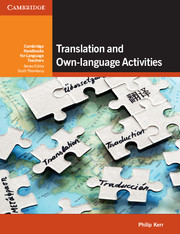Book contents
Summary
Techniques and activities
In the same way that learners can be said to have a dominant learning style, teachers have a dominant teaching style. This is informed by a set of beliefs and attitudes (which are often unexamined) and is manifested by the teacher's actions in the classroom. These actions include such things as the way we talk to students, the way that we manage a class and the basic teaching techniques that we use. Because these actions or behaviours are deeply rooted in our beliefs, we tend to repeat them, and the more we repeat them, the more automatic they become. They are hard to change.
A teacher's choice of materials or activities is, on the contrary, much more susceptible to change. Teacher-training workshops and teachers’ handbooks (such as this one) generally concentrate on materials and activities. When we plan our lessons, we tend to think first and foremost about activities – those that we particularly like or that we know will ‘work well’ – and most of us are keen to add to our repertoire and experiment with new ideas. Most of the chapters in this book will provide suggestions for materials and activities, but this chapter, the first main chapter, focuses on the most basic routines of our teaching: techniques. It is with these that I recommend that you begin to experiment.
Own-language use: psychological reasons
In most classrooms, there is no problem getting students to speak their own language! The problem is more likely to be getting them to stop using their own language and start using English. An English-only policy, either in individual classrooms or in entire institutions, is a well-intentioned but sometimes misguided attempt to deal with this problem. However paradoxical it may seem, the occasional, principled use of the students’ own language (by both the teacher and the students themselves) may lead to greater and richer use of English.
If we understand the reasons for our students’ reluctance or refusal to speak English, we may be better prepared to deal with the problem. It is easy to attribute such reluctance to laziness or a simple lack of cooperation, but these are possibly proximate, rather than ultimate, causes. The lack of motivation may have deeper roots.
- Type
- Chapter
- Information
- Translation and Own-language Activities , pp. 17 - 36Publisher: Cambridge University PressPrint publication year: 2014



